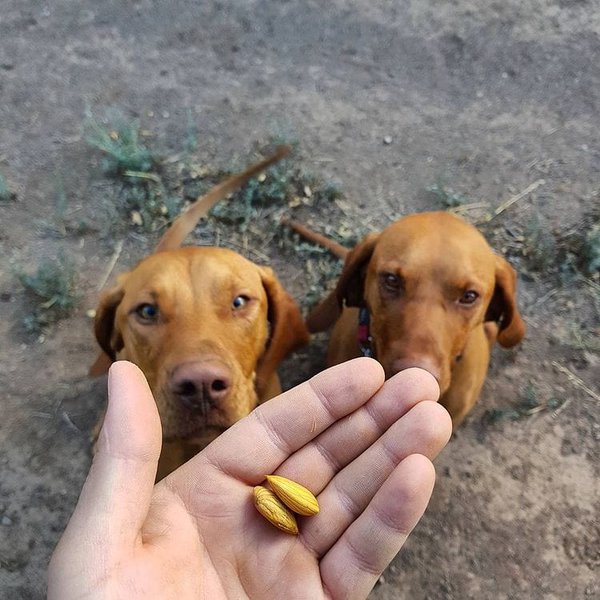Dogs are adorable and affectionate pets, especially when you have a strong bond with them. They always find everything you do worth emulating. When it comes to nutty snacks, you will agree with me that your pooch always wants to eat whatever you are eating.
Though nuts can be fun to feed your dog, the reality is that not all you and I eat are good for your dog. While some nuts are toxic to your dog, others might be good but need to be taken in a controlled proportion. What about almonds, and can dogs eat them?
Unlike other nuts, almonds are not toxic, and dogs can eat almonds safely. However, almonds are not good for dogs to consume in large quantities. This is because dogs find it difficult to digest them and this can pose health issues, such as diarrhea. Thus, almonds are not the best food choice for your pooch.
Some things you may be bothered about are why almonds are bad for your dogs, what happens if your dog eats almonds, and what you should do if your dog eats almonds. I have made deliberate efforts to answer all the questions in your mind in this article. But before then, let’s look at what almonds are and if your dog can eat them.
Can Dogs Eat Almonds?

Almonds are not poisonous nuts. Although dogs can take almonds without fear of any poisonous effect, they are not good for their health and are not the best nut for them. Unlike humans, dogs have a slow digestive system. Eating almonds can cause gastrointestinal stress in dogs which may lead to nausea, vomiting, and even diarrhea.
However, your dog can still take almonds in small quantities. As much as they are not good for dogs, they are not entirely bad either. In fact, many dogs love the taste of almonds. Gastrointestinal stress is not directly related to almonds. Any nut can cause upset in dogs. Just like humans, what may be good for one dog might not be good for the other.
What Are Almonds?
Almonds are edible nuts gotten from a tree known as Almond. They are perennials and have a massive amount of nutrients such as fats, fiber, protein, vitamins, and minerals. Almonds are non-toxic and are very beneficial to humans. They can be consumed as nuts and can also be made into different extracts such as almond flour, almond oil, butter, and milk.
Are Almonds Good For Dogs?
No! Almonds are not good for dogs.
Your dog may find almonds tasty and nice, but they are not very good for them. Generally, dogs’ digestive systems are not designed to cope with nuts. They have an inability to digest nuts fast enough, and when they eat almonds, it causes gastric intestinal stress and can lead to stomach upset which results in vomiting, nausea, or diarrhea.
However, almonds can be eaten by dogs but in smaller quantities. This means that if you are giving your dog almonds, then you should be vigilant on the amount you are giving your pooch to avoid health issues. Let’s talk about some of the benefits of almonds to dogs.
What Are The Benefits Of Eating Almonds For Dogs?
Almonds are packed with nutrients that offer great benefits to dogs. Here are some of the importance of almonds to your dog:
- Almonds contain powerful antioxidants that help in the healthy growth and the creation of red blood cells in dogs.
- It helps to prevent heart diseases and cancer in dogs.
- It advances bone development and helps in the production of vitamins and minerals for dogs.
- It helps in the growth and development of strong muscles in dogs.
Can Dogs Eat Almond Varieties?
No! Most almond varieties are not good for dogs due to their increased risk factor.
Varieties such as the Chinese almond and bitter almond contain traces of cyanide which are very toxic to your dog when ingested in large quantities.
Can Dogs Have Almond Butter, Oil, or Milk?
Extracts such as almond butter and almond oil are not toxic for your dogs. Dogs can eat almond butter in small quantities, and it comes with numerous benefits. Almond butter is rich in vitamins and also promotes healthy skin for dogs. Almond oil can also be added to your dog’s food to help with internal issues.
While dogs can make almond butter, oil and milk, they are not to be taken in large quantities to avoid ingestion problems. Almond oil and butter contain a large amount of fat, and it is only wise that you give your dog a small quantity to avoid obesity.
You should also check the ingredients to ensure they do not contain toxic substances that may be harmful to your pooch.
How Many Almonds Can A Dog Eat?
Almonds should be fed to dogs in smaller quantities. One or two almonds at a time are enough for your dog. While your dog can eat them without having any issues, you should also check out for signs of choking or indigestion.
Almond butter and oils can be added to your dog’s meal. Two spoons of almond oil or butter are enough for your dog. Too many additions of almond butter or oil in your dog’s meal might result in health issues.
What Happens If My Dog Eats Almonds?

There are a number of things that might happen when your dog eats almonds. One of them is gastrointestinal stress. Gastrointestinal stress is a condition of the digestive system that occurs when your dog finds it difficult to digest food. Diarrhea, Nausea, and frequent vomiting are visible symptoms that occur when your dog is suffering from gastrointestinal stress.
Choking is another thing you might observe in your dog when they ingest almonds. Dogs are unable to chew, and so they resort to swallowing most food substances in whole. Almonds are nuts, and when dogs swallow them, it might block their windpipe or intestine, which will lead to choking and can become very serious if not unblocked and treated immediately.
Why Almonds Are Bad For Dogs
Almonds are nuts, and nuts are not considered to be an ideal food for your dog. They are considered bad because of your dog’s inability to digest them quickly, which can cause gastric intestinal stress that triggers stomach upset, diarrhea, vomiting, nausea, loss of appetite, and discomfort.
When swallowed, almonds can be an obstruction to your dog’s digestive tract. Almond nuts can block their windpipe or esophagus, which is a severe condition that should be attended to immediately.
Almonds are high in fat. When eaten in large quantities, they may lead to obesity or pancreatitis in dogs. This is not a situation you would want for your canine.
The Potential Hazards of Almonds For Dogs
While almonds have a few benefits to dogs, there are many potential hazards that your dogs can face when they eat almonds. Some of them are listed below.
- Almonds can cause indigestion problems in dogs, and they may lead to vomiting and stooling.
- Choking is another major hazard of almonds to dogs. They can be an obstruction to dogs, thereby leading to choking.
- They can cause kidney and bladder stones in dogs.
- Almonds can lead to lethargy in dogs.
- Almonds have a high amount of fat, and too much intake may result in obesity in dogs.
Are Almonds Poisonous To Dogs?
No! Almonds are not poisonous to dogs.
Although almonds are not good for dogs, they are not poisonous. Almonds are far less toxic than other known nuts, and they are not poisonous to your dog except for the fact that they can cause health issues when they are eaten in large quantities.
Extracts such as almond flour and almond oil are non-toxic to dogs. They are well-refined almond extracts and are not poisonous. However, ensure to check the ingredients to ensure they do not contain any toxic substance before feeding your dog.
What To Do If Your Dog Eats Almonds
Almonds may not have an immediate effect on your dog, especially if they are not allergic and can digest it properly. However, if you notice that your dog ate almonds and is showing symptoms of gastric intestinal stress or choking, then you should take your dog to an experienced veterinary doctor for proper medical care.
If there are no visible signs of illness, you should examine your dog properly and be on the constant lookout for any emerging symptoms while making sure they are not feeling uncomfortable.
What Is The Instant Treatment Of Dogs After Eating Almonds?
If you notice your dog took in a large portion of almond nuts, you should take your pooch to the vet. Your vet can prescribe a drug that will help your dog clear the almonds from the stomach. For lack of hydration, IV liquids can be used.

The Safest Way To Give Almonds To Dogs
There are safe and better ways to give almonds to your dogs. One of them is giving your dog processed and refined almonds. This ensures that all toxic substances contained in the nut are removed, and the nuts are then considered safe for your dog to consume.
When feeding almonds to your dog, ensure you give them only small quantities they can digest easily. For nuts, you can give your dog just one or two nuts. Almond butter and oil can be included in food for your canine. One or two spoons of the extract are okay for your dog.
Are There Safe Alternatives To Almonds For Your Dog?
Yes! There are safe alternatives to almonds for dogs.
Nuts such as peanuts and roasted chestnuts are better alternatives to almonds. They contain the same nutrients as almonds and are equally beneficial to dogs.
Avoid coated and salted peanuts. They are not healthy nor beneficial to dogs, so do not give your beloved pooch peanuts in shells.






